Euro 2024 Betting Offers
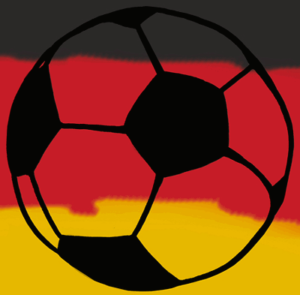 The European Championship was a fairly late comer compared to other continental competitions but it could now be argued that this tournament is second only in prestige to the World Cup. The championships first began in 1960 in France as the European Nations Cup with just four teams competing for the crown in a simple knockout. The competition rose to eight countries in 1980 when two group stages were added and rose again for Euro 1996 in England to include 16 teams with a quarter-final stage.
The European Championship was a fairly late comer compared to other continental competitions but it could now be argued that this tournament is second only in prestige to the World Cup. The championships first began in 1960 in France as the European Nations Cup with just four teams competing for the crown in a simple knockout. The competition rose to eight countries in 1980 when two group stages were added and rose again for Euro 1996 in England to include 16 teams with a quarter-final stage.
Since Euro 2016 the competition has risen to 24 teams now competing for the four yearlong title of the best footballing nation on the continent. The 2021 tournament (rescheduled from 2020 due to coronavirus) had no fixed host, instead played across 11 venues in 11 different nations. For 2024, however, this will revert back to a single host, Germany.
With so much to play for and not much else going on at this time of year expect some of the best betting offers from the nations top online bookmakers. We will list ever major deal available both in advance and day to day through the competition. This page also contains information on current odds, the schedule, TV coverage, history, previous winners, key stats and more.
Euro 2024 Betting Offers
This event has not started yet, please check back nearer the time. For other offers see our main loyalty page.
Euro 2024 Stadiums and Venues
| Stadium | City | Features | Capacity | Opened |
|---|---|---|---|---|
| Allianz Arena | Munich | Luminous Exterior | 70,076 | 2005 |
| Olympiastadion | Berlin | Olympic Running Track | 74,461 | 1936 |
| Westfalenstadion | Dortmund | Largest Standing Terrace In Europe | 65,849 | 1974 |
| Arena AufSchalke | Gelsenkirchen | Retractable Roof & Pitch | 54,740 | 2001 |
| Mercedes-Benz Arena | Stuttgart | Highest Resolution Video Walls | 54,697 | 1933 |
| Volksparkstadion | Hamburg | Transparent Coated Roof | 52,245 | 1953 (1998 Rebuilt) |
| Merkur Spiel-Arena | Düsseldorf | Retractable Roof | 51,031 | 2004 |
| RheinEnergieStadion | Cologne | Tall Stands Close To Pitch | 49,827 | 1923 |
| Waldstadion | Frankfurt | Retractable Roof | 48,387 | 1925 |
| Red Bull Arena | Leipzig | Largest Stadium Former East Germany | 42,959 | 2004 |
Euro 2024 Fixtures, Schedule & TV Coverage
Group A
| Date (Match No) | Time (UK) | Fixture | Stadium | Channel (UK) |
|---|---|---|---|---|
| 14th June (1) | 20:00 | Germany v Scotland | Allianz Arena | ITV |
| 15th June (2) | 14:00 | Hungary v Switzerland | RheinEnergieStadion | ITV |
| 19th June (14) | 17:00 | Germany v Hungary | Mercedes-Benz Arena | BBC |
| 19th June (13) | 20:00 | Scotland v Switzerland | RheinEnergieStadion | BBC |
| 23rd June (25) | 20:00 | Switzerland v Germany | Waldstadion | BBC |
| 23rd June (26) | 12000 | Scotland v Hungary | Mercedes-Benz Arena | BBC |
Group B
| Date (Match No) | Time (UK) | Fixture | Stadium | Channel (UK) |
|---|---|---|---|---|
| 15th June (3) | 17:00 | Spain v Croatia | Olympiastadion | ITV |
| 15th June (4) | 20:00 | Italy v Albania | Westfalenstadion | BBC |
| 19th June (15) | 14:00 | Croatia v Albania | Volksparkstadion | ITV |
| 20th June (16) | 20:00 | Spain v Italy | Arena AufSchalke | ITV |
| 24th June (27) | 20:00 | Albania v Spain | Merkur Spiel-Arena | BBC |
| 24th June (28) | 20:00 | Croatia v Italy | Red Bull Arena | BBC |
Group C
| Date (Match No) | Time (UK) | Fixture | Stadium | Channel (UK) |
|---|---|---|---|---|
| 16th June (6) | 17:00 | Slovenia v Denmark | Mercedes-Benz Arena | ITV |
| 16th June (5) | 20:00 | Serbia v England | Arena AufSchalke | BBC |
| 20th June (18) | 14:00 | Slovenia v Serbia | Allianz Arena | ITV |
| 20th June (17) | 17:00 | Denmark v England | Waldstadion | BBC |
| 25th June (29) | 20:00 | England v Slovenia | RheinEnergieStadion | ITV |
| 25th June (30) | 20:00 | Denmark v Serbia | Allianz Arena | ITV |
Group D
| Date (Match No) | Time (UK) | Fixture | Stadium | Channel (UK) |
|---|---|---|---|---|
| 16th June (7) | 14:00 | Poland v Netherlands | Volksparkstadion | BBC |
| 17th June (8) | 20:00 | Austria v France | Merkur Spiel-Arena | ITV |
| 21st June (19) | 17:00 | Poland v Austria | Olympiastadion | ITV |
| 21st June (20) | 20:00 | Netherlands v France | Red Bull Arena | BBC |
| 25th June (31) | 17:00 | Netherlands v Austria | Olympiastadion | BBC |
| 25th June (32) | 17:00 | France v Poland | Westfalenstadion | BBC |
Group E
| Date (Match No) | Time (UK) | Fixture | Stadium | Channel (UK) |
|---|---|---|---|---|
| 17th June (10) | 14:00 | Romania v Ukraine | Allianz Arena | BBC |
| 17th June (9) | 17:00 | Belgium v Slovakia | Waldstadion | ITV |
| 21st June (21) | 14:00 | Slovakia v Ukraine | Merkur Spiel-Arena | BBC |
| 22nd June (22) | 20:00 | Belgium v Romania | RheinEnergieStadion | ITV |
| 26th June (33) | 17:00 | Slovakia v Romania | Waldstadion | BBC |
| 26th June (34) | 17:00 | Ukraine v Belgium | Mercedes-Benz Arena | BBC |
Group F
| Date (Match No) | Time (UK) | Fixture | Stadium | Channel (UK) |
|---|---|---|---|---|
| 18th June (11) | 17:00 | Turkey v Georgia | Westfalenstadion | BBC |
| 18th June (12) | 20:00 | Portugal v Czech Republic | Red Bull Arena | BBC |
| 22nd June (24) | 14:00 | Georgia v Czech Republic | Volksparkstadion | BBC |
| 22nd June (23) | 17:00 | Turkey v Portugal | Westfalenstadion | ITV |
| 26th June (35) | 20:00 | Georgia v Portugal | Arena AufSchalke | ITV |
| 26th June (36) | 20:00 | Czech Republic v Turkey | Volksparkstadion | ITV |
Round of 16
| Date (Match No) | Time (UK) | Fixture | Stadium | Channel (UK) |
|---|---|---|---|---|
| 29th June (37) | 17:00 | Winner A v Runner-up C | Westfalenstadion | – |
| 29th June (38) | 20:00 | Runner-up A v Runner-up B | Olympiastadion | – |
| 30th June (39) | 17:00 | Winner B v 3rd A/D/E/F | RheinEnergieStadion | – |
| 30th June (40) | 20:00 | Winner C v 3rd D/E/F | Arena AufSchalke | – |
| 1st July (41) | 17:00 | Winner F v 3rd A/B/C | Waldstadion | – |
| 1st July (42) | 20:00 | Runner-up D v Runner-up E | Merkur Spiel-Arena | – |
| 2nd July (43) | 17:00 | Winner E v 3rd A/B/C/D | Allianz Arena | – |
| 2nd July (44) | 20:00 | Winner D v Runner-up F | Red Bull Arena | – |
Quarter Finals
| Date (Match No) | Time (UK) | Fixture | Stadium | Channel (UK) |
|---|---|---|---|---|
| 5th July (45) | 17:00 | Winner 39 v Winner 37 | Mercedes-Benz Arena | – |
| 5th July (46) | 20:00 | Winner 41 v Winner 42 | Volksparkstadion | – |
| 6th July (47) | 17:00 | Winner 43 v Winner 44 | Olympiastadion | – |
| 6th July (48) | 20:00 | Winner 40 v Winner 38 | Merkur Spiel-Arena | – |
Semi Finals
| Date (Match No) | Time (UK) | Fixture | Stadium | Channel (UK) |
|---|---|---|---|---|
| 9th July (49) | 20:00 | Winner 45 v Winner 46 | Allianz Arena | – |
| 10th July (50) | 20:00 | Winner 47 v Winner 48 | Westfalenstadion | – |
Final
| Date (Match No) | Time (UK) | Fixture | Stadium | Channel (UK) |
|---|---|---|---|---|
| 14th July (51) | 20:00 | Winner 49 v ? Winner 50 | Olympiastadion | ITV & BBC |
European Championships Format
Tournament Matches

All games are played over 90 minutes. All group matches end after 90 minutes with 3 points for a win, 1 for a draw and no points for a loss. The top two teams in each of the six groups qualify for the knockout stages, with the group winners playing the group runner-up or third placed qualifying team from another group. The group runners up will play a group winner or another runner-up. The best four third placed teams advance to the knockout stages, the other two are sent home.
From the last 16 onwards the competition is a true knock-out. If no winner is found in a knockout match the game will go to extra time and if the result is still in deadlock a penalty shootout is used to decide the outcome.
Prior to 1976 there was extra time but no penalties, this lead to the 1968 final between hosts Italy and Yugoslavia going to a reply following a 1-1 draw after extra time; Italy won the reply 2-0. 1976 saw the first penalty shootout in a European final when Czechoslovakia beat Germany 5-3 on penalties following a 2-2 draw after extra time.
For some unknown reason someone in FIFA and UEFA decided to introduce the golden goal for the 1996 European Championships in England. The golden goal system meant that if the game went to extra time a winner would be declared immediately if a winning goal was scored, forfeiting the remaining minutes of extra time. The golden goal decided the first final it was used in when Oliver Bierhoff scored in extra time resulting in Germany beating the Czech Republic 2-1. The system again decided the next finals in 2000 with David Trezeguet scoring the golden goal in extra time for France to beat Italy 2-1.
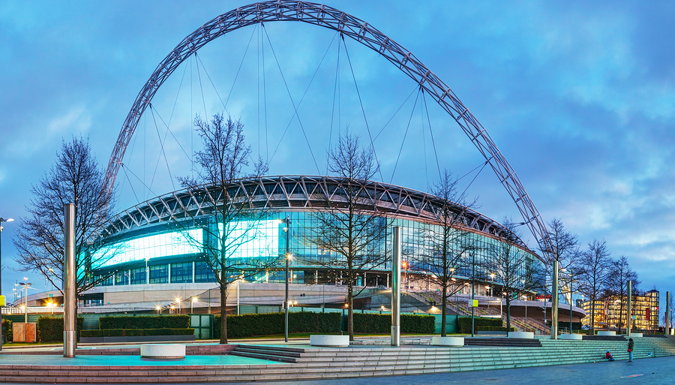
For Euro 2004 the golden goal was abolished for the even more ridiculous silver goal system. This meant that if a goal was scored in the first half of extra time then the game would continue but end at the end of the first half of extra time if that team were still winning. If a goal was scored in the second half of extra time then the game would continue as normal to the end. The system never actually decided a Euro final but it occur in the semi-final when Greece beat the Czech Republic with a silver goal.
Fortunately this is now all in the past. All games that now go to extra time will see a full thirty minutes played no matter how many goals are scored.
The European Championships, unlike the World Cup, does not have a match to decide overall third place. In total there are 51 matches to be played, 36 group games and 15 knockout ties. To win the tournament a team must play 7 matches in total.
Euro 2024 and The UEFA Nations League
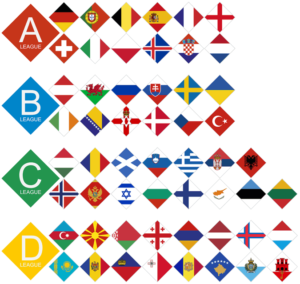 Euro 2024 will revert to one country with Germany qualifying automatically as hosts after Euro 2020 was played across multiple European cities with no country receiving a bye to the finals through having host status. The number of teams in the finals will remain the same at 24.
Euro 2024 will revert to one country with Germany qualifying automatically as hosts after Euro 2020 was played across multiple European cities with no country receiving a bye to the finals through having host status. The number of teams in the finals will remain the same at 24.
There will be ten Euro 2024 qualification groups that will begin after the 2022 world cup. Both the winner and runner up will qualify from each group making up 20 out of the 23 teams.
The remaining 3 teams will be drawn from the new linked UEFA Nations League. The Nations League, agreed in 2014 and launched in 2018 sees all 55 UEFA members divided into four leagues (A-D) based on current rankings. The leagues will have relegation and promotion and will see a champion crowned every two years, this will occur in odd numbered years to not conflict with the Euros or the world cup. The Nations League has been designed primarily to increase competitive international matches reducing the needless friendly system that is often abuses.
The final 3 places at Euro 2024 will be awarded one to each Nations League. The highest three teams in each league hat have not already qualified through the normal Euro qualification groups will compete in a playoff (semi finals then final). The winner from each league will then be awarded the final places. The Tournament finals will continue with the same format as Euro 2020.
Euro 2016
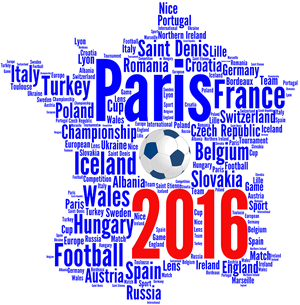 Euro 2016 saw the number of finalists increase to 24 for the first time. This allowed for a new round of 16 after the group stages, before the quarter finals. The winners and runners up from 6 groups automatically move into the last 16. The remaining 4 places are made up of the four highest 3rd place finishers. Portugal, the winners of Euro 2016, finished third in their group.
Euro 2016 saw the number of finalists increase to 24 for the first time. This allowed for a new round of 16 after the group stages, before the quarter finals. The winners and runners up from 6 groups automatically move into the last 16. The remaining 4 places are made up of the four highest 3rd place finishers. Portugal, the winners of Euro 2016, finished third in their group.
Qualification for Euro 2016 saw France qualify automatically as hosts with the remaining 23 places made up from the winners and runners up from 9 groups and the best third place team. The remaining 4 places were decided through a play off between the other 8 third placed teams.
Euro 1996 to Euro 2012
In 1996 the number of teams doubled from 8 to 16. The winners and runners up of each of four groups went through to the quarter finals. Apart from changes that saw both the golden and silver goal introduced and abolished the format for the finals remained constant.
Qualification for Euro 1996 was made up of England as host plus the 8 winners from 8 groups. The 6 highest runners up qualified automatically with the two worst second placed teams having a play off for the final place.
In 2000 the qualification group number increased to 9, the 9 winners went through as did the highest placed second team. The remaining 8 runners up had a play off for the other 4 places. Euro 2004 qualification increased to 10 groups with all winners getting a place and all second place teams competing for the final 5 places. For 2008 there were 7 qualification groups with all first and second place teams qualifying along with the two hosts. Finally for Euro 2012 the system reverted back to the same as Euro 2000.
Euro 1980 to Euro 1992
In 1980 the number of countries in the finals increased from 4 to 8 with a host selected in advance to qualify automatically through a bye. For the first time a group stage was added. Two groups of 4 teams produced one winner each who then competed in a final, the two second placed teams played for 3rd place. In 1984 both the winner and runner up went through and a semi-final stage was added with the 3rd place play off abolished. This continued up to and including Euro 1992.
Qualification at for these tournaments was made up of the winners from 7 groups plus the host.
Euro 1960 to Euro 1976
In 1960 17 countries competed in a qualification knockout over 22 months to produce 4 teams to go to the first finals in Paris. No host was selected but the host country decided between the remaining 4 countries. France was selected for the first finals. Teams then competed in a semi-final, final and 3rd place play off. The same system was used in 1964 although now 29 teams entered into qualifying.
In 1968 group stages were introduced for qualifying. From 8 groups the winners competed in a quarter-final knockout to qualify for the finals but until 1980 the number of finalists stayed at just four. Penalties were first introduced in 1976.
Previous Euro Winners
| Host | Year | Final | Result |
|---|---|---|---|
| Germany | 2024 | ? | ? |
| Pan EU | 2021 | Italy v England | 1-1 (3-2 Pens) |
| France | 2016 | Portugal v France | 1-0 (aet) |
| Poland & Ukraine | 2012 | Spain v Italy | 4-0 |
| Austria & Switzerland | 2008 | Spain v Germany | 1-0 |
| Portugal | 2004 | Greece v Portugal | 1-0 |
| Belgium & Holland | 2000 | France v Italy | 2-1 (aet) |
| England | 1996 | Germany v Czech Rep | 2-1 (aet) |
| Sweden | 1992 | Denmark v Germany | 2-0 |
| W. Germany | 1988 | Holland v Soviet Union | 2-0 |
| France | 1984 | France v Spain | 2-0 |
| Italy | 1980 | W. Germany v Belgium | 2-1 |
| Yugoslavia | 1976 | Czechoslovakia v W. Germany | 2-2 (5-3 Pens) |
| Belgium | 1972 | W. Germany v Soviet Union | 3-0 |
| Italy | 1968 | Italy v Yugoslavia | 1-1 (2-0 Replay) |
| Spain | 1964 | Spain v Soviet Union | 2-1 |
| France | 1960 | Soviet Union v Yugoslavia | 2-1 (aet) |
Home Nations Euro Stats
| Country | Finals | Qualifying | Highest Position | Goals For/Against* | W/D/L* |
|---|---|---|---|---|---|
| England | 10 | 15 | Final | 51 / 37 | 15/ 13 /10 |
| Scotland | 3 | 15 | Group Stage | 5 / 10 | 2 / 2 / 5 |
| N. Ireland | 1 | 15 | Last 16 | 2 / 3 | 1 / 0 / 3 |
| Wales | 2 | 15 | Semi Finals | 13 / 12 | 5 / 1 / 4 |
* Finals only, not including qualification
Tournament Stats
| Tournament | Team / Country | Player | |
|---|---|---|---|
| Goals (Most / Least) | 142 (2020), 7 (1968) | 78 (Germany), 1 (multiple) | Platini (9 in 1984), Ronaldo (14 2004-2020) |
| Goals/Game | 4.75 (1976), 1.4 (1968) | Netherlands (1.67), Multiple (0.33) | 1.80 (Platini) |
| Matches Played | 51 (2016-) | Germany (53) | Christiano Ronaldo (25 – 2153 minutes) |
| Most Titles / Medals | – | Germany, Spain (3) | Rainer Bonhof – 3 (2 winner & 1 runner up) |
History of the European Championships
Early Years
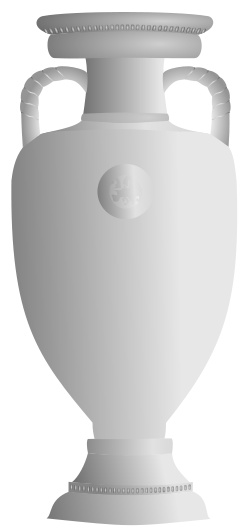 In 1927 Henri Delaunay, then secretary general of the French Football Federation, proposed the creation of a European continental football competition. Despite initial enthusiasm the political situation in Europe from the 1929 depression up to an including the second world war prevented the idea moving forward.
In 1927 Henri Delaunay, then secretary general of the French Football Federation, proposed the creation of a European continental football competition. Despite initial enthusiasm the political situation in Europe from the 1929 depression up to an including the second world war prevented the idea moving forward.
The creation of a tournament was in fact delayed until 1954 when the French publication, L’Equipe, and journalist, grandson of Henri Delaunay, Pierre Delaunay re-invigorated the idea. By this time most other continents had already created a national football championship and with tensions finally cooling across Europe the time seemed right to get moving.
Pierre Delaunay was appointed to the organizing committee in 1955 and by 1957 a format had been agreed. In 1958 the 17 members signed up to participate in the first event, named The European Nations Cup. This was around half of the members and excluded notable countries such as England, Italy, West Germany and the Netherlands.
The first ever match was a play off between the Republic of Ireland and Czechoslovakia needed to reduce the 17 teams down to 16, the Czech’s won. The first proper match was between the Hungary and the Soviet Union in 1958, over 100,000 people witnessed the USSR win in Moscow 3-1. The Soviet Union won the second leg 1-0 and then got a be straight to the finals when General Franco refused the USSR team access to the country for the quarter final.
From the four teams that remained (France, Soviet Union, Yugoslavia and Czechoslovakia) France were selected as the first host. This is probably mostly due to the major role the French had had in creating the European Nations Cup.
European Nations Cup 1960 – 1976
 France and Czechoslovakia were knocked out in the first ever semi-final leaving the Soviet Union and Yugoslavia to fight out the first final. The USSR won 2-1 after extra time at the Parc des Prices stadium in Paris, home to PSG.
France and Czechoslovakia were knocked out in the first ever semi-final leaving the Soviet Union and Yugoslavia to fight out the first final. The USSR won 2-1 after extra time at the Parc des Prices stadium in Paris, home to PSG.
The 1964 tournament followed the same format and was won by hosts Spain who beat the Soviet Union 2-1 at the Bernabeu in Madrid. The championship was again won by the hosts in 1968 as Italy beat Yugoslavia 2-0 in a replay following a 1-1 draw. This is the only ever final to be replayed in a time before penalty shootouts. Belgium were hosts in 1972 but the cup was this time won by West Germany who beat the Soviet Union 3-0.
The 1976 finals were held in Yugoslavia and for the first time penalties were used to decide the outcome. Following a 2-2 draw after extra time Czechoslovakia came out with a 5-3 victory over West Germany on penalties.
European Championships 1980 – 1992
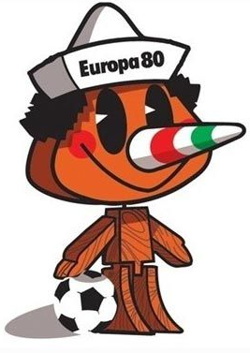 In 1980 for the first time a host (Italy) was selected in advance of the tournament and given a bye to the finals. The remaining 7 teams that joined entered into two groups of four with the winners competing in the final and the second placed teams in a playoff for third place. The 1980 final was won West Germany who beat Belgium 2-1.
In 1980 for the first time a host (Italy) was selected in advance of the tournament and given a bye to the finals. The remaining 7 teams that joined entered into two groups of four with the winners competing in the final and the second placed teams in a playoff for third place. The 1980 final was won West Germany who beat Belgium 2-1.
The 1984 finals were again held in France and the French won the cup for the second time. Michel Platini remains the top goalscorer at a European Championship with 9 goals scored in 1984. The Dutch beat the Germans in a raucous semi-final in 1988 before beating the Soviet Union 2-0 in the final.
Despite qualifying Yugoslavia were banned from competing in the 1992 finals held in Sweden due to war in the region. Demark qualified in their place and miraculously won the title beating a unified Germany 2-0 in the final.
1996 to 2012, The “Euros”
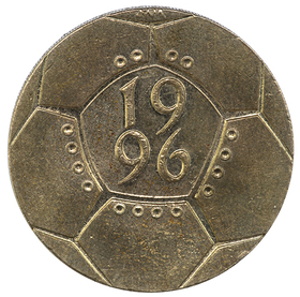 In 1996 the number of countries doubled to 16 and for the first time the term Euro was coined for Euro 1996. This was the first tournament in which a quarter final stage was played following the groups. Hosts England were knocked out on penalties by Germany in the semi-finals who went on to win beating the Czech Republic 2-1 with a golden goal in extra time.
In 1996 the number of countries doubled to 16 and for the first time the term Euro was coined for Euro 1996. This was the first tournament in which a quarter final stage was played following the groups. Hosts England were knocked out on penalties by Germany in the semi-finals who went on to win beating the Czech Republic 2-1 with a golden goal in extra time.
For Euro 2000 two hosts were selected for the first time in Belgium and Holland. 1998 World Cup Champions France went on to win beating Italy 2-1. Euro 2004 saw Greece win in a 1-0 victory over Portugal, Greece were 150/1 to lift the trophy prior to the competition.
The next two finals were again hosted by two countries, Austria and Switzerland in 2008 and Poland and Ukraine in 2012. Spain won both finals to become the first team to win on consecutive occasions beating Germany 1-0 in 2008 and Italy 4-0 in 2012. Spain also won the world cup in 2010.
France 2016
 France hosted for a record third time. France were fancied as the home nation and were impressive all the way to the final only to be undone by a dogged and determined Portugal winning 1-0 in extra time.
France hosted for a record third time. France were fancied as the home nation and were impressive all the way to the final only to be undone by a dogged and determined Portugal winning 1-0 in extra time.
It was ironic as it was Portugal who moaned endlessly about the Greek team that beat them in 2004 final being boring, defensive and rigid; just as they were in 2016.
The tournament emphasised how the competition has been set up to further support the traditional bigger teams. Portugal despite finishing third in the group phase without actually winning a single one of their first three games (all three drawn) were eventually crowned champions. Many would say the ability to do this detracts from the competition, although it is likely to remain this way for the near future at least.
Coronavirus Moves Euro 2020 to Euro 2021
 Euro 2020 was rescheduled by exactly one year following the corona virus pandemic that swept through the world in the Spring of 2020. With all football shut down UEFA and FIFA agreed in March that the event could not take place in 2020 and so agreed to move it back one year to exactly the same period in 2021.
Euro 2020 was rescheduled by exactly one year following the corona virus pandemic that swept through the world in the Spring of 2020. With all football shut down UEFA and FIFA agreed in March that the event could not take place in 2020 and so agreed to move it back one year to exactly the same period in 2021.
Given the nature of this tournament specifically as a pan-European competition rather than in just one country it was felt that even if the matches were played behind closed doors the traveling involved for the various nations would create extra risk. While many would have liked to see the Euros go ahead in 2020 I think most on balance see it is better to move it to 2021.
Pan-European Euro 2020 A Success, But English Heartache Again
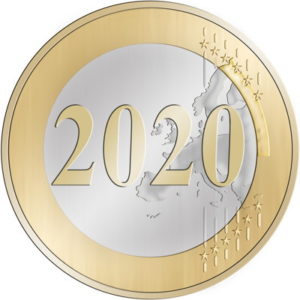 Euro 2020, in 2021 (which still sounds strange), was always going to be a bit of an unknown on the basis that it changed the format of the Championship by having no fixed host, with matches played across 11 cities in 11 countries. The fact that it was delayed and played amidst the backdrop of a pandemic, with reduced crowds and travel restrictions, only made it more interesting.
Euro 2020, in 2021 (which still sounds strange), was always going to be a bit of an unknown on the basis that it changed the format of the Championship by having no fixed host, with matches played across 11 cities in 11 countries. The fact that it was delayed and played amidst the backdrop of a pandemic, with reduced crowds and travel restrictions, only made it more interesting.
Thankfully Euro 2020 did not disappoint. It produced 142 goals in 51 matches, compared to 108 at Euro 2016, and only 2.9 yellow cards per match, compared with 4.02 in France 5 years earlier. The refereeing was particularly good as was VAR, which largely stayed out of the picture, where it should be.
Despite being pan-European there was home advantage for many teams, in particular England, who only made one trip to a ground other than Wembley on their way to the final, that was the Stadio Olimpico in Rome. Italy also contested all of their group games on home soil, and even three of the knockout games were at Wembley, so there was a sense of familiarity for both teams.
The weight of expectation was of course on England, playing in front of a home crowd. But as has been the case so many times before it wasn’t to be, with England drawing 1-1 with Italy and going on to lose 3-2 on penalties. Still, it doesn’t overshadow the tournament as a whole, which was an unqualified success.
Back To A Single Host For Euro 2024: Germany
 For the 2024 edition of the event the Euros will revert back to a single nation, Germany. This is not necessarily the end of a multi-nation tournament, the pan-European idea was a trail after-all and may come back in the future.
For the 2024 edition of the event the Euros will revert back to a single nation, Germany. This is not necessarily the end of a multi-nation tournament, the pan-European idea was a trail after-all and may come back in the future.
Germany will host the Euros for the first time as a united nation, with Euro 1988 having previously been held in West Germany. The Germans have won the event three times, but not since 1996, and will be looking to end their 28 year drought. This will not be an easy feat however with 80% of the best teams in the world now coming from Europe.
The event will have a similar structure to previous tournaments with 24 teams and 51 matches. Germany will however now qualify as hosts, meaning the number of qualification berths will go back to 23. If the Nations League continues to succeed the plan is to keep the same format, with 9 or 10 places coming from qualifying groups and 3 or 4 places from the Nations League.
Venues that will host the 2024 Euros include the: Allianz Arena, Veltins Arena, Mercedes-Benz Arena, Merkur Spiel-Arena, RheinEnergieStadion, Olympiastadion, Red Bull Arena, Waldstadion, Westfalenstadion and Volksparkstadion.
Euro 2028
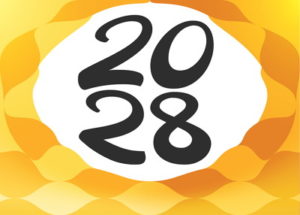 In 2028 the Euros will be split between five nations: England, Northern Ireland, Scotland, Wales and the Republic of Ireland, as group of countries near each other. The host was chosen in the autumn of 2023 with Turkey stepping aside when it was agreed they would co-host the 2032 Euros with Italy.
In 2028 the Euros will be split between five nations: England, Northern Ireland, Scotland, Wales and the Republic of Ireland, as group of countries near each other. The host was chosen in the autumn of 2023 with Turkey stepping aside when it was agreed they would co-host the 2032 Euros with Italy.
Romania, Greece, Bulgaria and Serbia expressed interest in submitting a joint bid but didn’t in the end. Italy and Russia also expressed an interest in hosting the event. Italy abandoned their bid in favour of pitching for the 2032 tournament and Russia’s bid was declared ineligible due to ongoing sanctions in light of the war in Ukraine. Portugal and Spain expressed an interest in being co-hosts and Denmark, Finland, Norway and Sweden considered joint bids but didn’t submit a formal bid in the end.
It will be the third time the European Championships have been held in England, either as a single host (1996) or co-host (2020, 2028). It will be the second time Scotland have hosted matches after matches were held in the country during the Euro 2020 pan-European tournament (held in 2021). Wales, Northern Ireland and Ireland will all be hosting matches for the first time.
Euro 2028 Stadiums and Venues
| Stadium | Country | City | Capacity | Opened |
|---|---|---|---|---|
| Wembley Stadium | England | London | 90,652 | 2007 |
| Tottenham Hotspur Stadium | England | London | 62,322 | 2019 |
| The Etihad | England | Manchester | 61,474^ | 2002 |
| Everton Stadium | England | Liverpool | 52,888 | 2025~ |
| St James’ Park | England | Newcastle | 52,305 | 1892 |
| Villa Park | England | Birmingham | 50,065* | 1897 |
| Principality Stadium | Wales | Cardiff | 73,592 | 1999 |
| Hampden Park | Scotland | Glasgow | 51,866 | 1903 |
| Casement Park# | Northern Ireland | Belfast | 34,578 | 1953 |
| Aviva Stadium | Ireland | Dublin | 51,711 | 2010 |
^ Etihad North stand redevelopment, capacity due to increase from 53,400 to 61,474 by 2026
~ Everton Stadium due to open in 2025
* Villa Park north stand to be redeveloped increasing capacity from 42,640 to 50,065
# Casement Park due to be redeveloped

 ;
; ;
; ;
; ;
;

